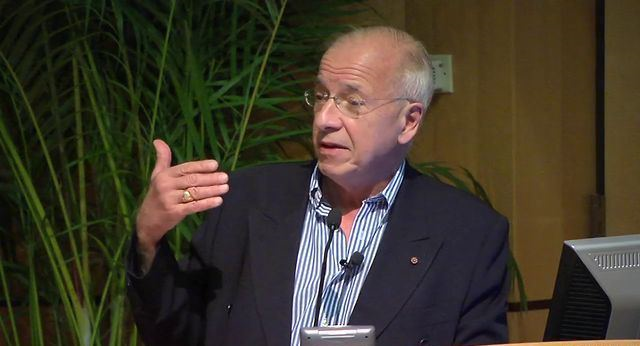
Alejandro Portes, the keynote speaker at the 2013 CRI Conference
On May 23–25, 2013, CRI sponsored its Ninth Conference on Cuban and Cuban-American Studies around the main theme of "Dispersed Peoples: The Cuban and Other Diasporas," at the Modesto A. Madique Campus of Florida International University.
The meeting gathered members of several generations of researchers from multiple disciplines and perspectives, with a shared interest in Cuban and Cuban-American affairs. The program featured prominent experts on Cuba and its diaspora, as well many younger scholars and graduate and undergraduate students at various stages of their academic careers. As a result, the conference continues to be one of the best occasions to take stock of the current state of knowledge about Cuba and its diaspora.
This year, CRI received a record number of paper and panel submissions, so the program was extended to three full days, with four concurrent sessions scheduled throughout each of these days. Altogether, the conference consisted of 46 panels, with 259 participants, the largest conference ever in CRI's history. Conference participants came from throughout the United States, including Florida, New York, California, Illinois, and even Hawaii. In addition, several colleagues came from other countries like Spain, France, the United Kingdom, Poland, Canada, Mexico, Colombia, Puerto Rico, and Trinidad and Tobago. The conference had an international, intergenerational, multidisciplinary, and multilingual (English, Spanish, and Spanglish) atmosphere.
The panels represented a broad spectrum of the humanities and social sciences, from literary criticism, art history, linguistics, and philosophy to history, sociology, anthropology, economics, and political science. Discussion topics ranged widely from national identities and racial issues to recent economic and social reforms, to health care and investment opportunities in Cuba, to reconciliation between Cubans on and off the Island. The program interweaved a rich tapestry on Cuban and Cuban-American culture, history, politics, and economics.
In response to CRI's call for papers and panels, many presentations focused on the main conference theme, "Dispersed Peoples: The Cuban and Other Diasporas." Alejandro Portes, one of the foremost authorities in migration studies, gave the keynote address on "A Bifurcated Enclave: The Peculiar Evolution of the Cuban Immigrant Population in the Last Decades." CRI also sponsored a screening and panel discussion of a digitally remastered version of the classic film about the Cuban diaspora, El Súper (1979). The panel included the playwright Iván Acosta; directors León Ichaso and Orlando Jiménez Leal; and producer Manuel Arce.
Plans are underway to publish a bilingual anthology of conference papers with Editorial Aduana Vieja. The call for manuscripts was circulated to all conference participants.
Uva de Aragón put together the program as expertly as she did on prior occasions. CRI staff members Aymee Correa, Paola Salavarria Romero, Lennie Gómez, and Nirka Zapata efficiently provided essential administrative support during several months of preparation for the conference. Alison Fraunhar generously collaborated with the film screening and panel discussion of El Súper. Countless FIU administrators, faculty members, and students contributed to making this a seamless and well-organized event.
The conference was cosponsored by the FIU African and African Diaspora Studies Program, the Center for the Humanities in an Urban Environment, the Exile Studies Program, the Latin American and Caribbean Center, and WPBT2. In addition, the Ford and Open Society foundations and the Cuba Study Group supported the conference financially. The artist Humberto Calzada graciously allowed CRI to reproduce his work on the program cover. Southern Wine & Spirits also made a donation for the welcoming reception.
The CRI Conference on Cuban and Cuban-American Studies continues to be one of the nation's premiere gatherings of scholars working on Cuba and proof of the continued interest in the study of Cuba.
Click here for the Conference Program.
Click here for a synopsis of the edited volume based on the conference.